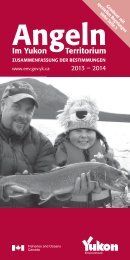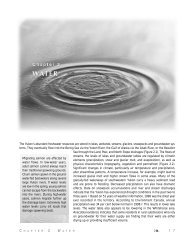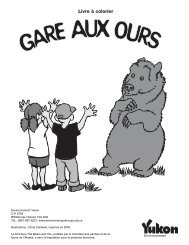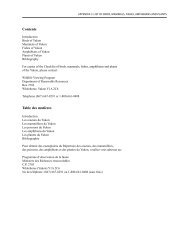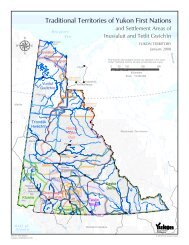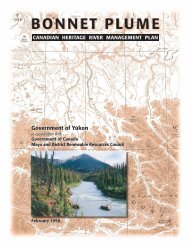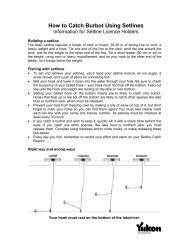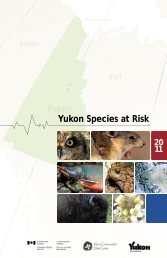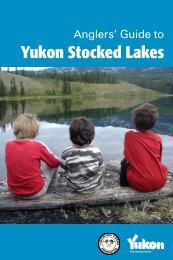Ch. 3 Land - Environment Yukon
Ch. 3 Land - Environment Yukon
Ch. 3 Land - Environment Yukon
You also want an ePaper? Increase the reach of your titles
YUMPU automatically turns print PDFs into web optimized ePapers that Google loves.
Direct Costs:<br />
■ Picking up Whitehorse residential<br />
garbage – $61.33 per tonne<br />
■ Disposing of Whitehorse residential<br />
garbage – $60 per tonne<br />
■ Operating rural waste sites – up<br />
to $5,000 per year with current<br />
practices (amount could increase<br />
under the new solid waste<br />
regulations)<br />
■ Operating the Whitehorse <strong>Land</strong>fill<br />
– $528,242 (Average cost 1996<br />
to 1998)<br />
■ Developing a new ‘cell’ at the<br />
Whitehorse <strong>Land</strong>fill – $320,000<br />
Indirect Costs:<br />
■ Air pollution from burning waste<br />
in landfills<br />
■ Harm to wildlife attracted to<br />
dumps, especially bears<br />
■ Littering caused by paper and<br />
plastic wastes blowing away<br />
from landfills<br />
■ Leaching from landfills may<br />
contaminate groundwater<br />
■ Water runoff from landfills may<br />
pollute surface waters<br />
tonnes of waste<br />
200,000<br />
150,000<br />
100,000<br />
50,000<br />
0<br />
Tipping fees come to town<br />
After studying various approaches used<br />
to reduce the amount of solid waste<br />
dumped in landfills, the City of<br />
Whitehorse has decided to make<br />
garbage disposal more of a user-pay<br />
system. But instead of asking users to<br />
pay the full costs of operating the<br />
landfill, the city has opted for a 50/50<br />
split on these costs. Half of the money<br />
for running the program will come from<br />
taxes, while the other half will come<br />
from tipping fees charged at the landfill.<br />
With tipping fees, people pay<br />
according to the amount of garbage<br />
that they dump at the landfill. Tipping<br />
fees provide a small financial incentive<br />
for households and businesses to<br />
reduce their waste as it is no longer<br />
cheaper to have everything hauled to<br />
the dump. Lower taxes for both<br />
businesses and residences will help to<br />
offset the new fees.<br />
In Whitehorse, the fee is $1 per visit for<br />
up to eight bags of garbage, and $4 per<br />
pickup truck load. Bigger loads will be<br />
weighed and assessed a charge of $15<br />
per tonne. The tipping fees double if<br />
construction and demolition wastes are<br />
mixed in with household garbage.<br />
Residential Waste<br />
Commercial Waste<br />
1992 1993 1994 1995 1996 1997 1998<br />
Figure 3.15 Data summary of Whitehorse landfill volume estimates<br />
Users from outside the City limits are<br />
charged the full disposal cost of $60<br />
per tonne since they do not contribute<br />
to the landfill costs through taxes. There<br />
is no tipping fee for compostable or<br />
locally recyclable materials. Households<br />
with city garbage collection will have a<br />
monthly fee of $2 added to their bills to<br />
cover their share of landfill costs.<br />
Tipping fees are standard in most of the<br />
country and have been shown to<br />
reduce the amount of waste delivered<br />
to dumps by anywhere from 15 to 45<br />
per cent. In southern Ontario, tipping<br />
fees range from $100 to $150 per<br />
tonne.<br />
It is estimated that the user-pay system,<br />
implemented in November 1999, will<br />
further reduce residential waste by 15<br />
per cent and commercial waste by 30<br />
per cent, extending the life of the<br />
landfill by six years and saving the city<br />
$1,466,750 over the next 30 years.<br />
All large waste loads will be weighed<br />
and assessed the appropriate tipping<br />
fee. Small, non-commercial loads will<br />
be directed through the transfer station<br />
to areas where people can properly<br />
sort and drop off household garbage,<br />
tires, wood waste, compost, and<br />
reusable and recyclable materials. The<br />
transfer station is slated to begin<br />
operations in July 2000.<br />
Proposed Solid Waste<br />
Regulations<br />
The <strong>Yukon</strong> government began<br />
developing Solid Waste Regulations in<br />
1998. The draft regulations called for a<br />
ban on open burning at dumps and a<br />
requirement for permits to build and<br />
operate waste disposal sites. However,<br />
during the public review, municipalities<br />
were concerned about the high<br />
increases in operating costs and the<br />
proposed ban on open burning was<br />
dropped prior to the regulations being<br />
approved. The new regulations will<br />
establish modern standards for building<br />
and operating dumps and landfills in<br />
C H A P T E R 3 L A N D ❧ 5 5



